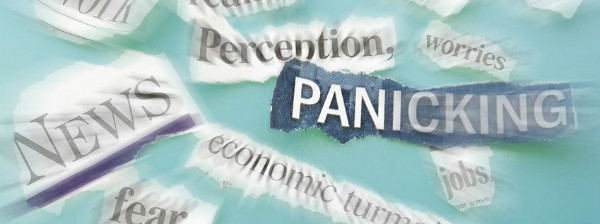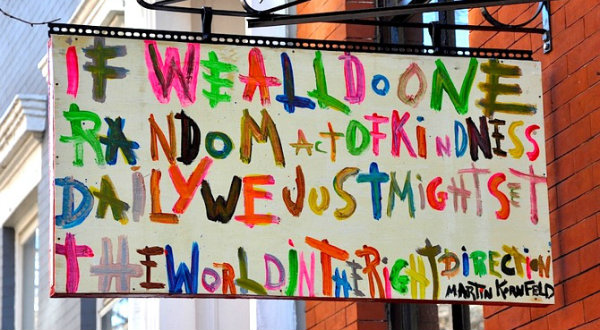Breaking free from our negativity bias
05 Jul 2013 | Nick Begley

* Pensioner dragged off scooter and mauled to death by
pair of killer donkeys
* Twisters of Terror
* My Mother Has Betrayed Me
Got your attention? These are just a handful of alarming headlines
I've seen in the mainstream newspapers today. In fact, for every
positive story presented in the media there are 17 negative
stories, yet this presentation of positive to negative events
doesn't tally with reality. For every good thing that you
experience in your day-to-day life, do you experience 17 horrendous
things? Probably not, you'd be extremely unlucky if you did! But in
that case, why does the media present such a negatively biased view
of our world? Does bad news really sell?
Research has shown that we have a built-in negativity-bias. We tend to recognise angry
faces faster than happy faces and remember bad events more than
good events. For healthy relationships we need to experience five
positive events to outweigh each negative event. Basically our
brains are continually scanning the environment for threats.
Doesn't sound great does it? But there's a very good reason for
this. Our negativity bias helped us survive in the Savannah when
there really were regular threats to our lives. For example, if we
heard a rustling in the bushes it was better for us to jump to the
conclusion that it was a sabre tooth tiger that would rip us apart
and eat us alive, rather that assume it was a harmless bird we
could enjoy for lunch.
Our ancestors who assumed the worst lived to see another day and
passed their anxious genes down to us, even if they were wrong nine
times out of ten. Whereas the ones who assumed the best, if they
got it wrong just once, would have been eaten, and therefore less
likely to pass their optimistic genes down to us. So in these
threatening conditions, it paid to have this negativity bias.
Nowadays though, we live in a much much safer environment, where we
very rarely have to worry about such dangers at all. But our threat
system is still just as active as ever - and ironically it may even
more active, thanks to our negatively-biased media coverage.
We're not wired to cope with knowing about every threatening
event which occurs around the world. Our brains assume that the bad
news we digest is likely to impact us directly. For the main part
of human history we lived in tribes of 30-500 people, so when we
heard of a murder or an imment famine, our stress response quite
rightly kicked into action to motivate us to avoid the potential
threat. Today however we don't just read bad news from our local
community, which may actually impact us. Rather, we are deluged by
stressful information from all around the world, most of which has
no impact on our lives whatsover. But our body and mind still take
serious note of this bad news - and they respond as if it could
impact us. Throw in the internet and global social networking and
we risk becoming inundated with stress evoking news 24/7. As a
result we develop an overly distrustful and threatening view of the
world that can have seriously damaging consequences for our mental
and physical health.
So is there an antidote to this negativity bias? One promising
route lies in encouraging people to notice more of the good things
happening around them and to do more kind deeds for others, which
in turn helps restore people's faith the common good.
Neuroscientists have found that performing kind acts evokes activity in the
same centres of the brain that light up when we experience
pleasure. This is why we often feel that warm glow when giving
money to charity or watching Amelie take her neighbour's gnome all
round the world. But it doesn't stop there, sharing our own
happiness is actually likely to make others happy too as, believe
it or not, our emotions are contagious.
Researchers from Harvard investigated how
happiness propogates through social networks. They looked at
more than 50,000 relationship bonds, assessing over 5,000 people
over a period of 20 years. The researchers found that when one
person became happy, there was a 25% increase in the chances of a
friend, a mile away becoming happier. They even found that their
happiness impacted people they didn't even know. A friend of a
friend of the happy person was 10% more likely to be happy and a
friend of a friend of a friend of the happy person was 5.6% likely
to be happier. That's three degrees of separation away! To put that
in the context of money, they found having an extra $5,000
increased a person's chances of becoming happier by only 2%. In the
words of the lead researcher "Someone you don't know and have never
met-the friend of a friend of a friend-can have a greater influence
than hundreds of bills in your pocket."

To help encourage more good deeds and redress the negativity
balance, Martin Saunders has developed Karmr - a free
social networking app that lets you get in touch with the many kind
acts that everyday people are experiencing all around the world
moment by moment. For example, today you can see that Jen bought
her friend dinner to celebrate her promotion, Patrick helped a
friend start up her food business by arranging a meeting with an
expert in the industry for her and Amy just bought a homeless man a
cup of coffee.
Apps like Karmr remind people to notice and share the millions
of good deeds that they see or perform every day. This helps us
feel good and it helps others around us feel good too. But perhaps
most importantly it helps to restore that which the media often
takes from us unjustly - our faith in the common good of
humanity.

Nick Begley is co-founder of PSYT, a company that uses a combination of
technology and live training to enhance psychological well-being
and productivity. Prior to PSYT, Nick worked as Head of Scientific
Research at mindfulness company Headspace.
If you'd like to get involved with a global project to uncover
the kindness, good and trust within our societies then why not download Karmr today.
Tags:
Look for what's good, Be comfortable with who you are